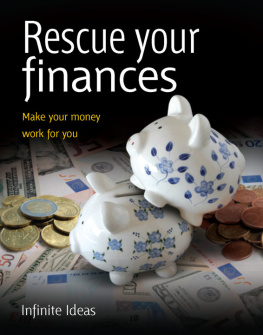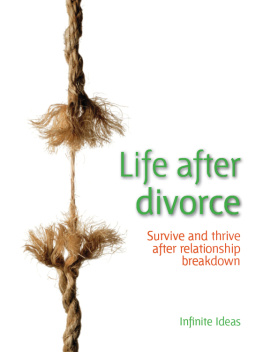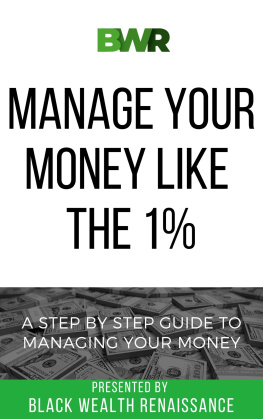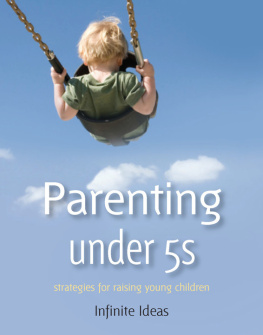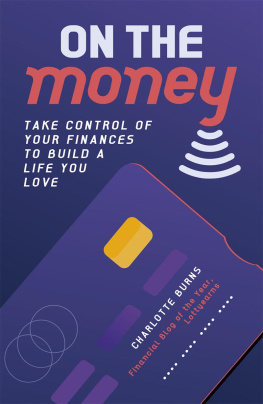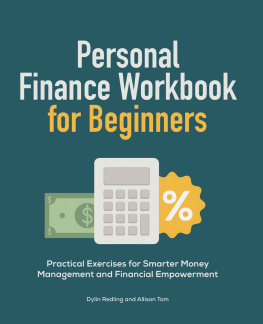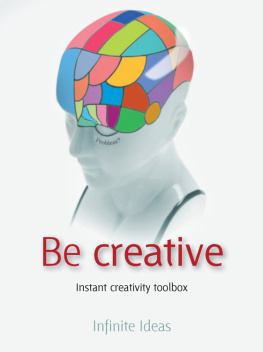Rescue your finances
Make your money work for you
Infinite Ideas
Previously published in paperback as Make your money work

8. Be a butterfly, not a barnacle
Forget loyalty: heres how to raise fickleness to a profitable art form.
As customers, we have never been so disloyal as in this era of vast consumer choice. The sum total of this tsunami of fickleness is bad news for companies who, on average, lose around half of their customers within five years, but good news for us, because companies are competing harder and harder for our custom.
These days, the shopping world very much belongs to us disloyal butterflies. Here is our five-point manifesto:
- Go for anyplace, anytime shopping. If you can buy a CD from a website at whatever time of the day or night suits you and at a price that will probably blow away your local CD shop, it seems daft not to click that mouse and pop it in your online shopping basket.
- If its on sale at more than one place, there will be a best price out there. If youre prepared to check out a few stores, youll almost certainly find that you can get a discount somewhere.
- Buy second-hand. Buy from a private seller in the Amazon online marketplace or bid for any item on eBay and you can save a fortune.
- Dont ignore charity shops and jumble sales. Although they have a fair proportion of items that wouldnt turn your head, you will find some good-quality stuff as well, not to mention some genuine bargains.
- Make use of online price comparison services. By spending a few minutes on a website like pricerunner.co.uk, you can easily see a list of prices for a wide range of products you might be interested in buying, from both online and high street stores.
Heres an idea for you
If you buy a computer game when it first comes out, its likely to retail at or around its recommended retail price. Give it six months and often it will be discounted heavily. Likewise, unless youre a fashion slave, hold on for the sales.
Defining idea
If no one is pissed-off with you then you are dead but just havent figured it out yet.
TOM PETERS
9. Dont max your tax
It used to be just the rich that got soaked for tax now it seems like we all do. Dont pay more tax than you absolutely need to (sounds like a vote-winner to me).
Being scrupulous and attentive to detail will almost certainly yield opportunities for you to pay less tax. So here are six steps to completing and sending back your tax return:
1. Get all your tax records together, such as bank and building society statements, business earnings, expenses or accounts where appropriate. If you have received a paper tax return, read pages 1 and 2 first.
2. Check youve got all the pages you need. If your tax affairs are more complex than average, you may need more than the basic tax return. Contact your tax office in this case, or alternatively you might be able to download the relevant papers from the internet.
3. Fill in the tax return by following the guidance notes supplied. Make sure you understand them and are sure of the figures you want to enter before putting any figures down. In particular, keep an eye out for expenses that you are allowed to set against tax membership of professional bodies and so on.
4. If you need help, contact your tax office.
5. Check your tax return once youve finished, make sure you havent forgotten anything, like signing it and attaching all your supplementary papers and relevant forms.
6. Make sure that you submit it before the deadline, or you risk having to pay a fine.
After youve sent in your return, most tax offices would expect you to hang on to the supporting documents and records for at least 12 months. If youre self-employed, you should retain your calculations and supporting documents for anything up to seven years.
Heres an idea for you
Using the Internet can be well worth while. You can complete an online tax return just days before the closing date for returns and your tax will be automatically calculated for you. However, it can be worth double-checking the numbers. Software glitches are not unknown.
Defining idea
Never mess with the VAT people. Theyre as different from the Income Tax people as Al Qaeda from dinner ladies.
LINDA SMITH, comedian
10. Watch out for fraud
Theres no need to get paranoid: here are some tips and wrinkles for reducing the chances of it ever happening to you.
The chances of any of us becoming a victim of credit card fraud are still low. Nonetheless, certain types of financial fraud are on the increase. Identity theft grew by 45 per cent in 2003 while fraud at cash machines went up by a third. Cardholder-not-present (CNP) fraud which involves Web, phone and mail order transactions is now the biggest fraud category. Here are eight suggestions for repelling fraudsters:
- Always shred or burn your financial receipts and statements once you have finished with them.
- Retain your receipts and check them against statements. If you spot anything untoward, get straight onto your bank or credit card company. Pay particular attention to checking any online-only accounts you may have.
- Never disclose your personal or financial details to anybody who cold calls or emails you.
- If you move, redirect mail immediately. The new occupants will probably just bin any bank and credit card statements, leaving you vulnerable.
- Check your credit report from time to time to make sure that nobody has opened an account in your name.
- If you are expecting a card or chequebook and it hasnt turned up, report it to the provider in question.
- Watch out for anybody standing too close and using a mobile phone while you are using a cash machine. Mobiles can be used to record PIN numbers remotely.
- Resist irresistible offers, especially if they seem to involve helping people get funds out of African countries, or offer foolproof methods for winning Canadian lotteries.
Heres an idea for you
When it comes to repelling the fraudsters, we are only as good as the passwords we use. Make sure that you create different passwords for the different accounts you hold, particularly online. Remember that you are at real risk when the fraudster can easily guess your card PIN number. Avoid using easily traceable facts about you such as your date of birth.
Defining idea
Who you gonna believe me or your own eyes?
CHICO MARX
11. Manage your credit
Its well worth exploring how well you use credit. Well also look at the value of credit as a means of smoothing over short-term cashflow issues.
Credit is simply another word for debt, and a debt card sounds a lot less palatable, doesnt it? So just reflect for a moment on how you tend to use your credit, sorry, debt card. Chances are youre using it when you cant afford to buy something outright, and so you buy the item on credit. But when you dont have the money in your current account this month to pay for the item in question, does it occur to you to consider whether youre any more likely to have the money next month to pay off this new debt? The chances are that you are going to be equally strapped for cash next month, in which case youre in danger of heading inexorably into a world where it will take you an age to clear the core debt.
However, it is possible to use credit cards so that they work to our advantage and not the other way around. Here are some tips for making best use of them:
- If you can pay outright without using a card, do so.
- Always try to pay off at least 10 per cent of your balance every month on your credit cards if you only pay the minimum it will cost you loads and take an age to clear.
Next page
